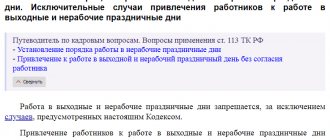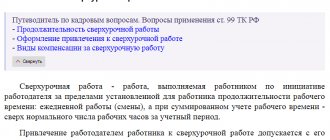Astral
November 27, 2021 9911
Accounting and HR
Irregular working hours are a special mode of work that allows, by order of management, to involve some employees to perform tasks outside of regular working hours (Article 101 of the Labor Code of the Russian Federation). Who can install this mode? How many hours can an irregular working day last? Is there an additional charge for it? Let's look at these questions in order.
Concept and definition
The generalized concept of an irregular working day in Russian legislation is given by Article 101 of the Labor Code of the Russian Federation, according to the definition of which it is a regime that goes beyond the generally accepted limits, while simultaneously fulfilling the following conditions:
- presence of management order;
- the existence of a previously compiled and agreed upon with the elected activists list of positions of employees involved in irregular work schedules under the collective agreement;
- justification of the need for involvement by the employer;
- being of an episodic nature.
On the basis of what events does the employer have the right to issue an order and what does it mean occasionally during irregular working hours? What should you consider when developing a list? Since the “reader” does not contain a direct answer for commercial structures, the rules for public sector employees approved by Decree of the Government of the Russian Federation No. 884 of December 11, 2002 can be applied.
Irregular work schedule is established:
- managers, deputies and heads of production departments;
- engineering and technical personnel;
- persons whose work cannot be timed;
- citizens who allocate time at their own discretion;
- employees whose nature of work involves dividing their time into periods of indefinite duration.
The list has been approved for citizens financed from the federal budget. For commercial enterprises, it can exist as a “starting point” when forming professions in local documentation when establishing the appropriate regime.
Important point
In practice, it may happen that an employee’s position is included in the list of positions with an irregular schedule already in the process of the person’s work activity. In such situations, the law requires that employees be informed in advance about upcoming changes. Notification is provided in writing 2 months before the introduction of the new regime.
The provisions of Article 74 of the Labor Code allow for changes in working conditions solely as a result of changes in the organizational or technological system at the enterprise. We are talking, in particular, about the introduction of new production technology, structural reorganization, etc. The employer must have justified reasons for including a specific position in the list.
Limitations of “non-standardization”
The Labor Code does not establish a norm for overtime during irregular working hours. The introduction of a regime should be directly related to the nature of the labor function, the presence of compelling reasons for the employer, if it is episodic and does not turn into systematicity.
In accordance with Letter of Rostrud No. 1316-6-1 dated 06/07/2008, it is possible to attract an employee before the start and after the end of the shift. Time worked is not recognized as overtime hours with appropriate compensation and compliance with guarantees regarding the duration determined by internal documentation.
For persons working irregular working hours, restrictions are imposed on their involvement in production activities on holidays and weekends. According to Letter of the Ministry of Labor No. 14-2 / OOG-8616 dated October 29, 2018, work on non-working days is allowed subject to compliance with legal standards.
Since 01.01.2019, an addition has been made to Article 101 of the Labor Code of the Russian Federation regarding irregularity for persons registered under a shortened time regime. An irregular period can be set for an employee if two conditions are met:
- establishment of a shortened work week;
- determination of the day of full duration by the schedule.
If a citizen is assigned a part-time day, then engagement in irregular work is not permitted, which directly follows from the wording of the amended norm. The restriction included part-time workers within 4 hours a day, with the exception of part-time workers registered at the main enterprise that keeps the work book, in a shortened week, which allows accepting the employee in accordance with the norms of Article 101 of the Labor Code of the Russian Federation.
According to the Labor Code, an irregular working week is prohibited for the following categories of persons:
- disabled people, regardless of group;
- those under 18 years of age according to their passport;
- women during pregnancy;
- single parents raising children under 14 years of age;
- working in hazardous conditions in accordance with the establishment of a class of harmfulness or danger by special certified commissions.
In order to avoid controversial situations during inspections, internal regulations should not include all positions according to the staffing table; it is important to establish selectivity and define criteria.
Employer Responsibilities
The employee does not always agree to change his schedule. If an employee refuses to work during irregular hours, the employer must offer him in writing another vacant position that meets his qualifications, a lower position, or a job that pays less, taking into account the employee’s health condition. If such a position or work does not exist at the enterprise, in accordance with Part 1 of Article 77 of the Labor Code, the employment contract is terminated.
Definition of valid time
Russian legislation establishes a standardized work schedule; how many hours daily depends on the number of working days per week. The standard duration is 40 hours per week, 8 hours daily with the accepted “five-day week”.
Article 97 of the Labor Code of the Russian Federation allows for an employee to be involved in work beyond the norm in two cases regulated by law:
- if irregular working hours are established by internal local documentation;
- if there is an objective need for overtime work.
- Shortened working hours: when and for whom is it possible?
Since Article 101 of the Labor Code of the Russian Federation does not define the factor of irregularity in the number of hours, and the above letters from the labor department refer to the impossibility of transforming a working day into an extended one, the duration of an irregular working day for a year should logically not exceed the time of overtime work provided for in Article 99 of the Labor Code of the Russian Federation.
Restrictions are established for overtime work at the following time intervals:
- excess overtime of 120 hours per year;
- attracting for 4 hours more than two days in a row.
In relation to an irregular working day, neither the Labor Code nor the Ministry of Labor regulates how many hours per week, month or year, only stating the frequency and objective reasons for performing duties in a specific period. However, processing cannot be established daily, and must be carried out in accordance with the established document flow.
Design and work schedule
The concept of an extended regime of functional obligations applies only to those cases where the employee starts work earlier or is slightly delayed after its completion. These hours are not shown in the work schedule.
In practice, the number of hours worked over the required hours is not taken into account. So it turns out that a worker can be at the workplace continuously for up to 12 hours, while only 8 hours of worked time will be entered on his report card.
At the same time, he is entitled to a legal three days of vacation in addition to the main one. Other compensation issues will have to be adjusted with the employer. The subordinate’s obligation to stay after everyone has gone home and finish the task unfinished during the day occurs only if such a regime was agreed upon in advance.
Documenting
The introduction of an irregular work schedule by a business entity must be accompanied by documentation, which is important for management and for hired personnel. The establishment procedure includes several stages:
- Establishment and approval of a register of positions of a legal entity or individual involved in work with an irregular regime, including:
- filling specific positions by employees;
- agreement with the active members of the trade union, if any;
- approval by a collective agreement of an institution or organization.
- Familiarization with the document against the signature of employees and implementation in the internal rules, mandatory for execution by the employees involved. Further refusal of a citizen to work according to an irregular time schedule is equivalent to failure to perform official duties.
- Fixation in an individual contract upon admission or in an additional agreement if an irregular working day is established for an employee on the payroll. Time intervals must be specified in a local document, and the approved schedule:
- not “dimensionless” in duration in terms of hours and establishment period;
- associated with the execution of direct orders included in the category of duties within the scope of the labor function.
- Issuance of an order when necessary and sufficient conditions arise.
If the position held is not on the list, then the employee has the right to refuse the established regime without applying disciplinary measures due to the lack of legal grounds. Explanation and justification of the reasons are not required, since non-inclusion in the list will cancel the position from those attracted in the event of non-standard situations and exceptional circumstances.
The consent of a specialist, in the absence of a documented norm, provides rights and compensation payments similar to the rest of the team.
What does irregular working hours mean for an employee and an employer?
Before agreeing to an irregular work schedule, it is advisable to familiarize yourself with what awaits a citizen and what an employer can count on after signing an employment agreement with such a norm.
For the employee this will mean the following:
- Consent to a delay (early exit) will be asked at the workplace only once - at the time of signing the employment contract. Further, the worker will be obliged to carry out the orders of his immediate supervisor;
- An employee will not be able to refuse to do work after the end of the working day. This will be equated to a violation of labor discipline, with the application of disciplinary sanctions provided for by law. It is important to understand here that attraction should be episodic. Otherwise, it is easy to prove that this is overtime work;
- In the employment contract, it is advisable to outline the scope of “activities outside the schedule.” For example, indicate that the functions are performed outside the main working hours, but no more than 2 hours before its start or end;
- such activity should be periodic (for example, once a week or once a month when reporting is required). If such work is on a permanent basis, the employee has the right to demand a change in the schedule with payment for the time actually worked;
- working under conditions of an extended period means performing a larger volume of the same type of functions. This cannot be regarded as an assignment of other duties that go beyond the scope of the employment contract (work instructions);
- as compensation for this regime, a minimum of 3 days of additional leave is required (mandatory). Based on the terms of the employment agreement or collective agreement, additional payments may also be applied, allowances may be established, and bonuses may be paid.








